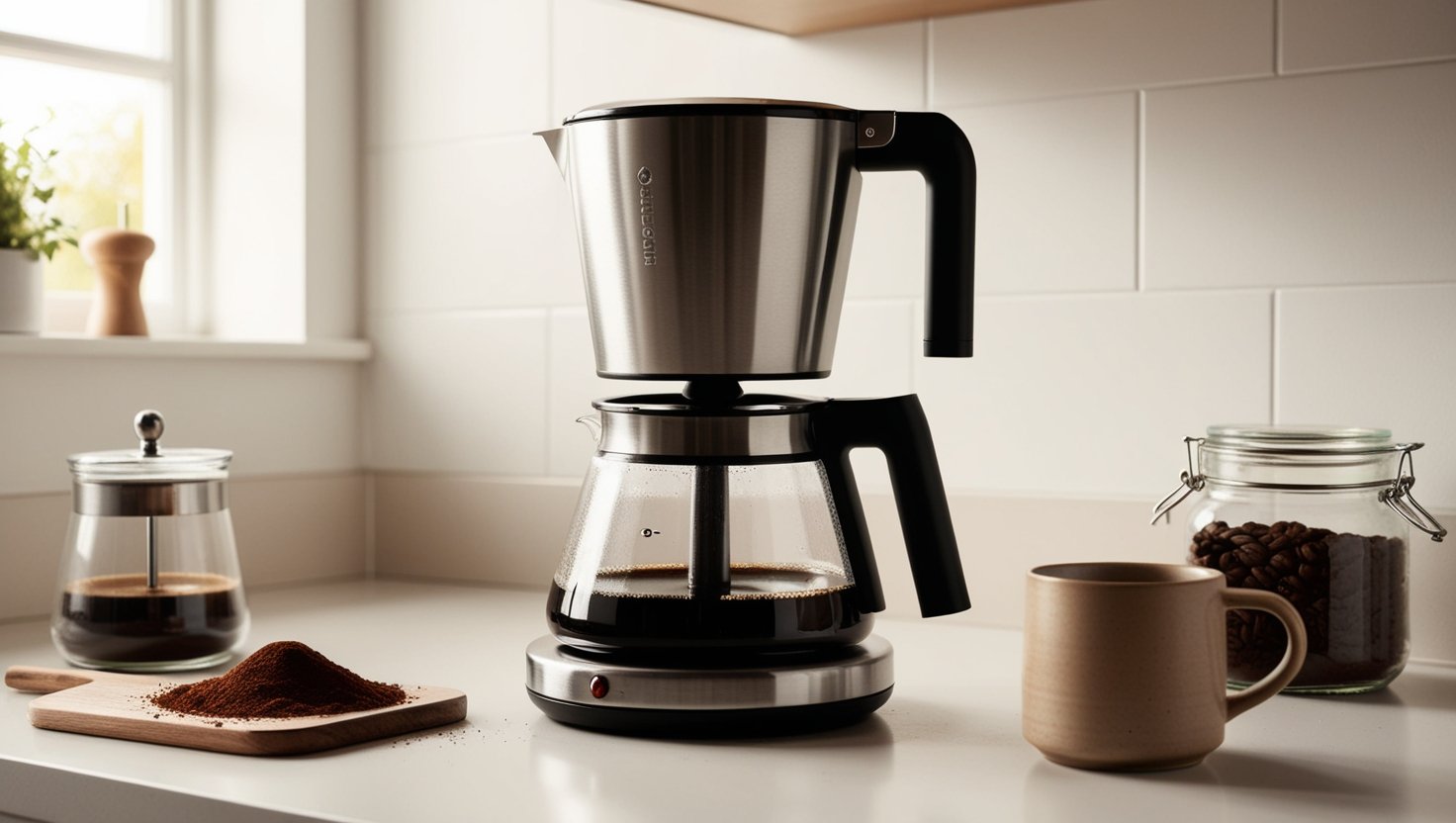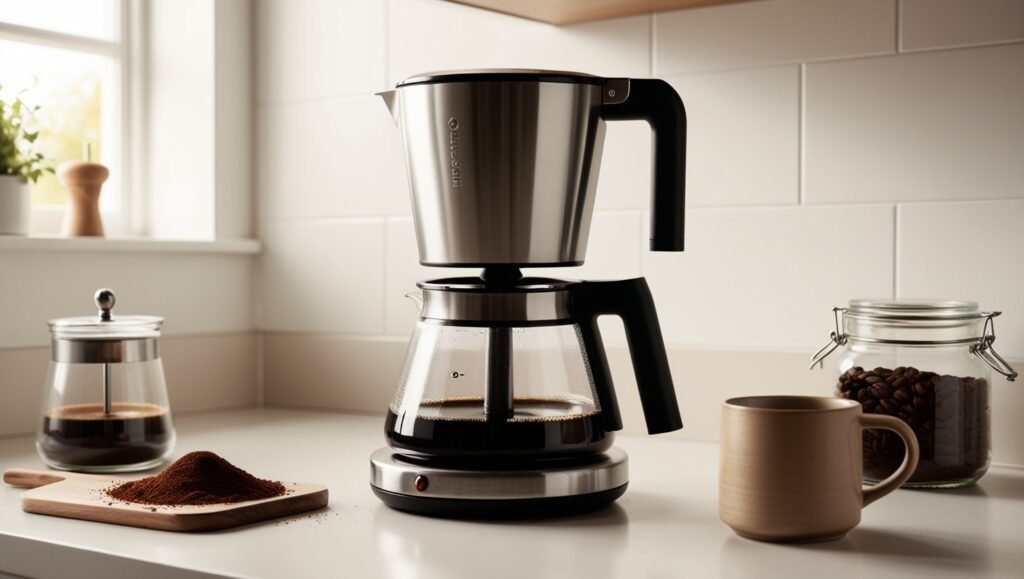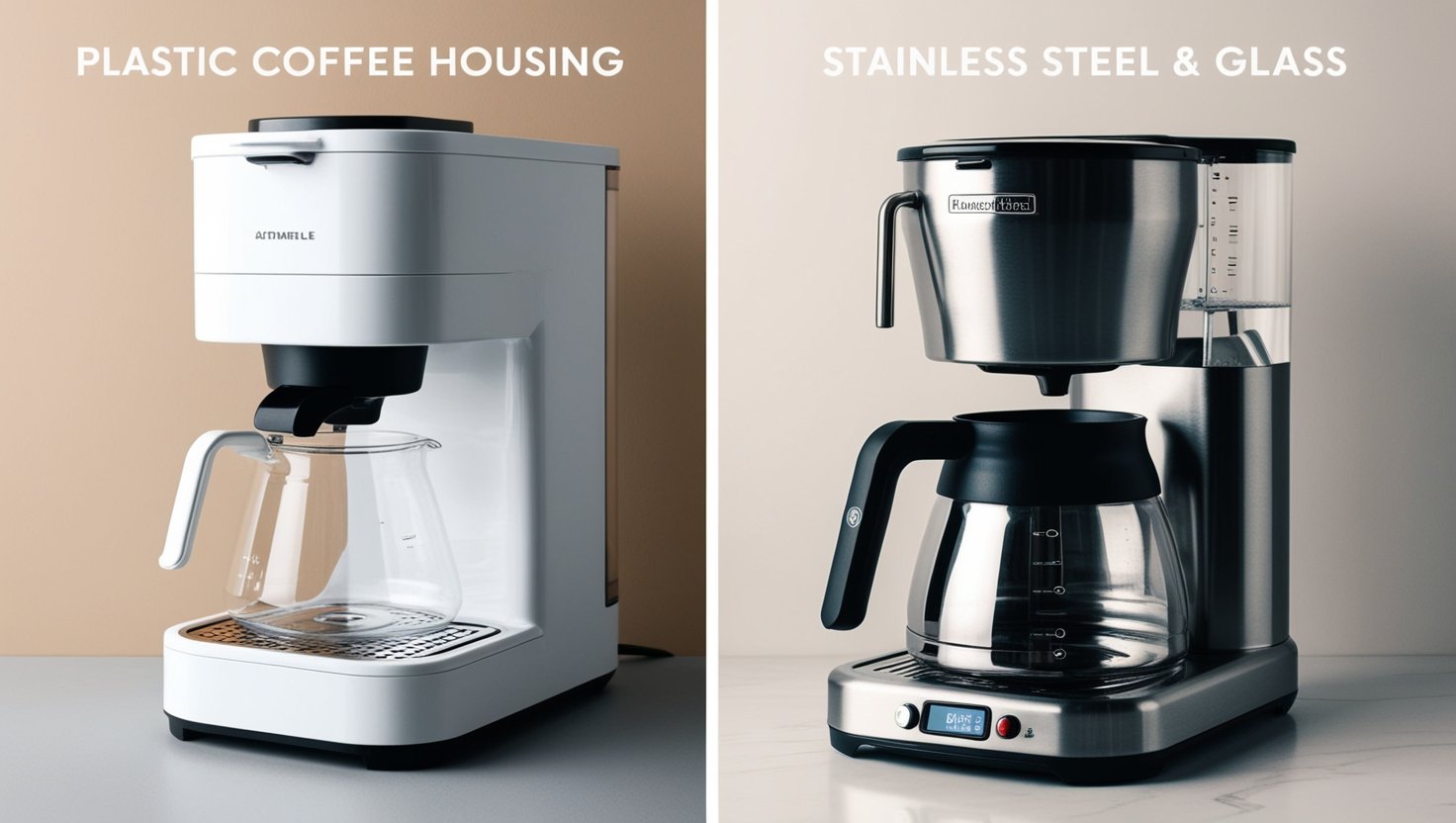Is There an Automatic Drip Coffee Maker Without Plastic Parts?
☕ The Scent of Coffee—and Something Else

When Martin bought his first sleek automatic coffee maker, he imagined peaceful mornings, a warm mug in hand, and the subtle aroma of freshly brewed beans filling his kitchen.
But something felt… off.
After a few weeks, he began noticing a plastic taste in his brew, especially when the water ran hot. At first, he thought it was just the beans. Then he tried others. Still, the taste persisted.
After a quick search, he discovered a thread of concerned coffee lovers online, all pointing to the same culprit: plastic parts in the coffee maker leaching taste—and potentially harmful chemicals—into the brew.
That realization led him to a question more people are asking:
Is there an automatic drip coffee maker without plastic parts?
Let’s dive into the truth about plastics, your coffee, and the few machines that dare to ditch them entirely.
The Problem with Plastic in Coffee Makers
Most automatic coffee makers use plastic components for water reservoirs, piping, filter baskets, and carafes lids. While it’s cost-effective and moldable, it comes with a cost.
🧪 Plastic and Heat Don’t Mix Well
When heated, certain plastics can release Bisphenol A (BPA) and phthalates—chemicals linked to hormone disruption, developmental issues, and even certain cancers.
🔬 According to a 2018 study published in Environmental Health Perspectives, BPA exposure, even at low levels, may disrupt hormone function in adults and children.
📖 Source
While many coffee makers now advertise “BPA-free”, that doesn’t always mean safe—it just means BPA has been replaced by similar compounds like BPS, which may carry similar risks.
☕ Taste Compromise
Coffee lovers are among the most sensitive to flavor shifts. Even tiny amounts of plastic can:
Impart a chemical aftertaste
Interfere with the aromatic profile
Create inconsistencies in brewing
For people who invest in high-quality beans or filtered water, this is frustrating.
What Should You Look for Instead?
If you’re committed to avoiding plastic, here are the components to evaluate in an automatic drip machine:
| Component | Best Material |
|---|---|
| Internal tubing | Stainless steel or silicone |
| Water reservoir | Glass or stainless steel |
| Filter basket | Stainless steel or glass cone |
| Carafe | Glass or thermal stainless steel |
| Showerhead / brew head | Stainless steel |
The goal is to find a model where heated water never touches plastic. That’s rare—but not impossible.
Are There Automatic Drip Coffee Makers Without Plastic Parts?
Yes—but with a few caveats.
Here are three categories of plastic-free (or mostly plastic-free) automatic drip coffee makers:
1. Technivorm Moccamaster (Select Models)
Made in: Netherlands
Price: $$$
Plastic-free contact? Almost completely
Technivorm is known for its aluminum housing, stainless steel brew basket, and copper heating element. While some external parts are plastic, water and coffee only touch metal or glass.
💡 The Moccamaster is certified by the European Coffee Brewing Centre (ECBC) for temperature stability and consistency.
Why it works:
Glass or thermal carafe
Optional metal filter basket
Consistent brew temps (196–205°F)
2. Ratio Six Coffee Maker
Made in: USA
Price: $$$
Plastic-free contact? Yes—with a thermal carafe
The Ratio Six features:
Stainless steel showerhead
Borosilicate glass or stainless steel water pathways
Thermal stainless carafe
No plastic touches your water or brew if you use the stainless filter basket.
Design-wise, it’s also one of the most elegant on the market.
3. Bunn VP17-1 Stainless Steel Brewer
Made in: USA
Price: $$
Plastic-free contact? Largely stainless steel internals
This commercial-style machine is rugged, no-frills, and built to last. With internal stainless tubing and a stainless steel tank, the Bunn minimizes plastic exposure—but may need a custom metal filter basket for full plastic-free function.
Ideal for:
Office use
Cafés
High-volume home brewers
Are There Truly 100% Plastic-Free Coffee Makers?
The reality: even high-end models often have some plastic—either in exterior housing or minor components like lids or knobs.
However, many models ensure that plastic never touches hot water or coffee, which is the most critical factor.
Why Aren’t More Brands Offering Plastic-Free Coffee Makers?
It comes down to:
Cost of manufacturing stainless steel or glass components
Consumer price sensitivity
Design complexity
Industry inertia
💬 According to Statista, nearly 10 million drip coffee makers are sold annually in the U.S.—but fewer than 5% are high-end or alternative-material models.
🔗 Source
Most consumers still buy plastic-based models, unaware of the long-term health, taste, and sustainability tradeoffs.
Plastic-Free Coffee Is Part of a Bigger Movement
The interest in plastic-free brewing overlaps with:
Zero-waste kitchens
Low-tox living
Sustainable appliance design
As more people become mindful of microplastics in water and food, the demand for fully metal or glass appliances is rising.
🌍 A 2022 survey by GreenPrint found that 64% of Americans are willing to pay more for products that are environmentally safer.
🔗 Source
What About Single-Serve Machines?
Most single-serve brewers—like Keurig—are plastic-heavy, including:
Pods
Internal tubing
Reservoirs
Even if BPA-free, the amount of heated plastic is concerning. For those committed to plastic-free brewing, single-serve machines should be avoided unless radically redesigned.
Can You Taste the Difference?
Yes—many enthusiasts and professionals say coffee brewed without plastic:
Has a cleaner mouthfeel
Preserves natural acidity
Highlights origin flavor notes
A blind taste test by a specialty café in Portland revealed that 80% of tasters preferred coffee brewed through all-metal or glass components.
While that’s anecdotal, it supports what many already believe: materials matter.
Where Coffea Alchemy Fits In
At Coffea Alchemy, we’re passionate about helping you brew coffee that’s pure, flavorful, and intentional—right down to the materials you use. Our guides and product reviews are designed for those who care about what’s in their mug—and what their mug is made with.
If you’re trying to eliminate unwanted flavors or chemicals in your morning ritual, choosing the right coffee maker is the first step toward clarity in your cup.
Final Thoughts
So—is there an automatic drip coffee maker without plastic parts?
Yes, but you’ll need to look beyond big-box store brands. Models like the Moccamaster, Ratio Six, and Bunn VP17 offer high-performance brewing without the compromise of heated plastic. While not every machine is 100% plastic-free, several ensure that your water and coffee only touch glass, stainless steel, or other inert materials.
Choosing one of these machines isn’t just a win for your coffee—it’s a win for your health, taste buds, and the environment.
What would your coffee taste like without plastic in the way?
Related Post
Our newsletter
Subscribe to our weekly newsletter & keep up with our latest recipes and organized workshops. You can unsubscribe at any time.


